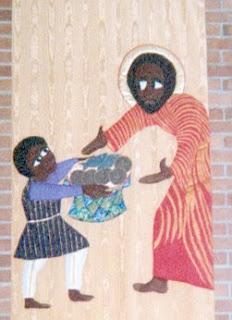We’re in this together. This way of seeing, hearing, following and, yes, teaching and witnessing to what God desires to keep doing for us, for world.
Theologian Marva Dawn recommends that whenever we English readers come across the word, “you,” in the bible, we pronounce it with a southern accent, as in, “y’all.” She claims that, more often than not, understanding that pronoun to be ‘second-person plural,’ rather than ‘second-personal singular’ we’ll be linguistically correct. I recall that she advised this strategy even before the publication of Robert Putnam’s Bowling Alone.
That’s an important corrective in our era when so many spiritual sojourners describe themselves as on a solitary pilgrimage, rather than a shared journey. These wanderers give themselves away with words like, “I’m spiritual but I avoid organized religion.”
Now, to be sure, most of us who are part of organized religion have more than our share of Will Rogers’s moments. When asked about his political affiliation Rogers responded, I’m not part of an organized political party. I’m a Democrat.”
Still, from its advent, the Christian movement has been much more about God’s for us, than it’s ever been about God and “me, myself, and I.” Just look at the politically charged freedom-songs - lifted high and far - by Zechariah, father of John the Baptist (Luke 1:68-79), and Mary, mother of Jesus (Luke 1:46-55).
That’s the other important piece solitary sojourners risk missing. The Christian movement’s earliest liberation songs struck powerful chords against the political status quo. They were, if at all, only secondarily about reforms required or anticipated within organized religion – even when we take into account the emperor-worship that redounded to the Romans. The personal liberation these songs pronounced were sung in the context of political oppressors (plural) whose undoing would lift up the lowly and give salvation to the Most High’s people (both refrains plural).
In short, in this Christian movement’s ethos, I’m not free, when you and y’all aren’t free!
That, too, is a piece of the movement’s (really the Mover’s) first premise. What’s been gifted to one has been given for the sake of all. Solitary sojourners deprive the rest of us travelers the benefit of both their knowledge and insight. Without their God-given best nearby and available to critique or worst, from within, what keeps their hoarded gifts from being squandered?
There are outcroppings of gathered believers (the Greek, ekkesia, translated as ‘church’ means, literally, ‘called-out ones’) who’ve given up worship wars, who are done dueling over dogmatism and take the words of Paul to all members of the church at Philippi seriously.
9And this is my prayer, that your love may overflow more and more with knowledge and full insight 10to help you to determine what is best, so that in the day of Christ you may be pure and blameless, 11having produced the harvest of righteousness that comes through Jesus Christ for the glory and praise of God. (Philippians 1:9-11).
Together we are alert for knowledge to help us assess the things that differ to our advantage, vis-à-vis, the powers and principalities that work to their exclusive advantage. Together we express our insights to one another so that we avoid self-rationalization and consequent arrogance.
Sharing our journey’s missteps we take seriously the promise that purity and blamelessness are realities we’ll experience in the day of Christ, by God’s remembering our failings through the lens of Christ’s faithfulness and works, not our own. Sharing our journey’s miscues we harvest good at all only when, by grace through faith, we produce in our own day, with our own voices, those long-ago lyrics of liberation - work songs, if you will - which are personal, powerful, profound, profuse, and plural.
Friday, December 08, 2006
Subscribe to:
Post Comments (Atom)




No comments:
Post a Comment